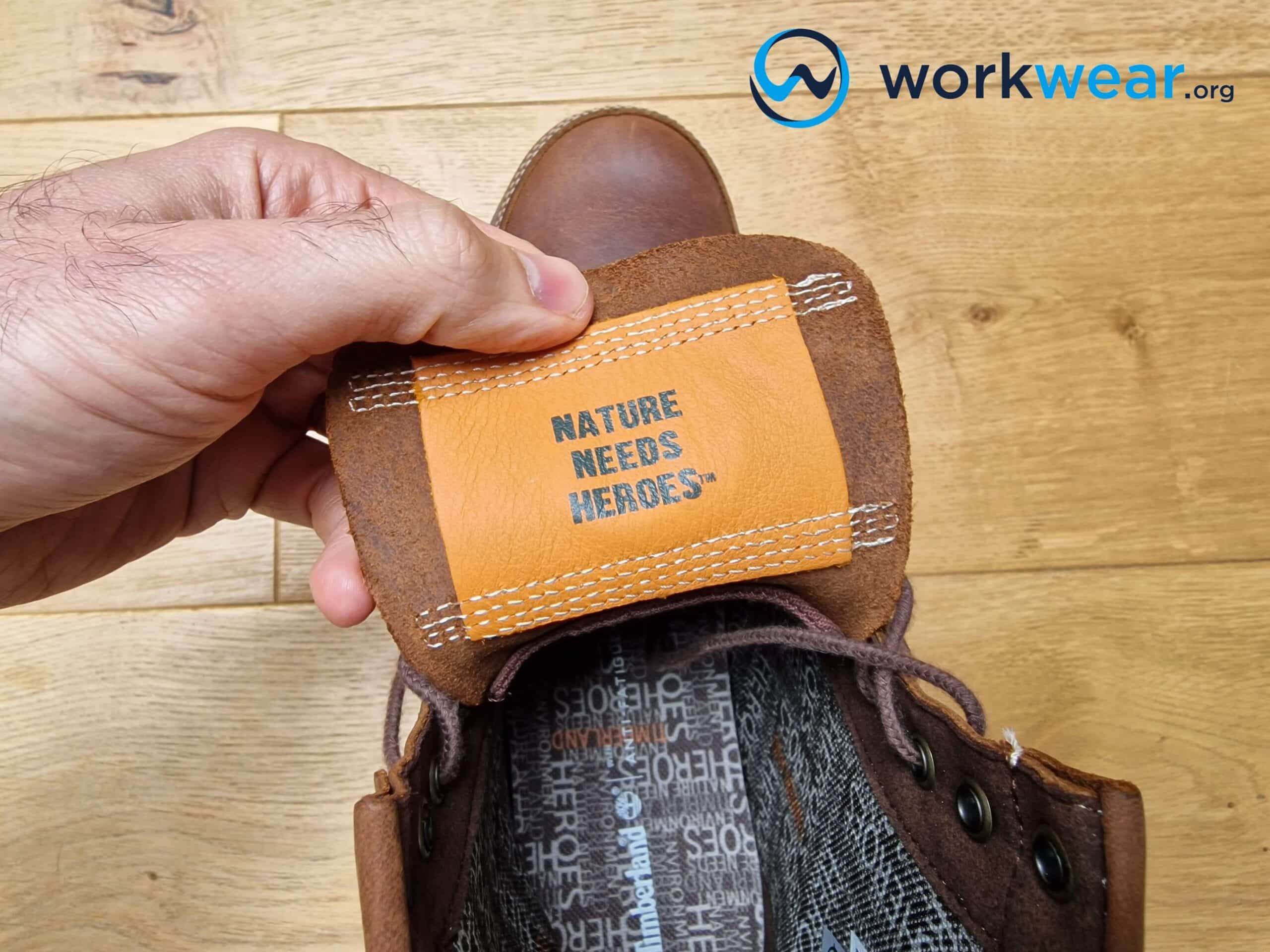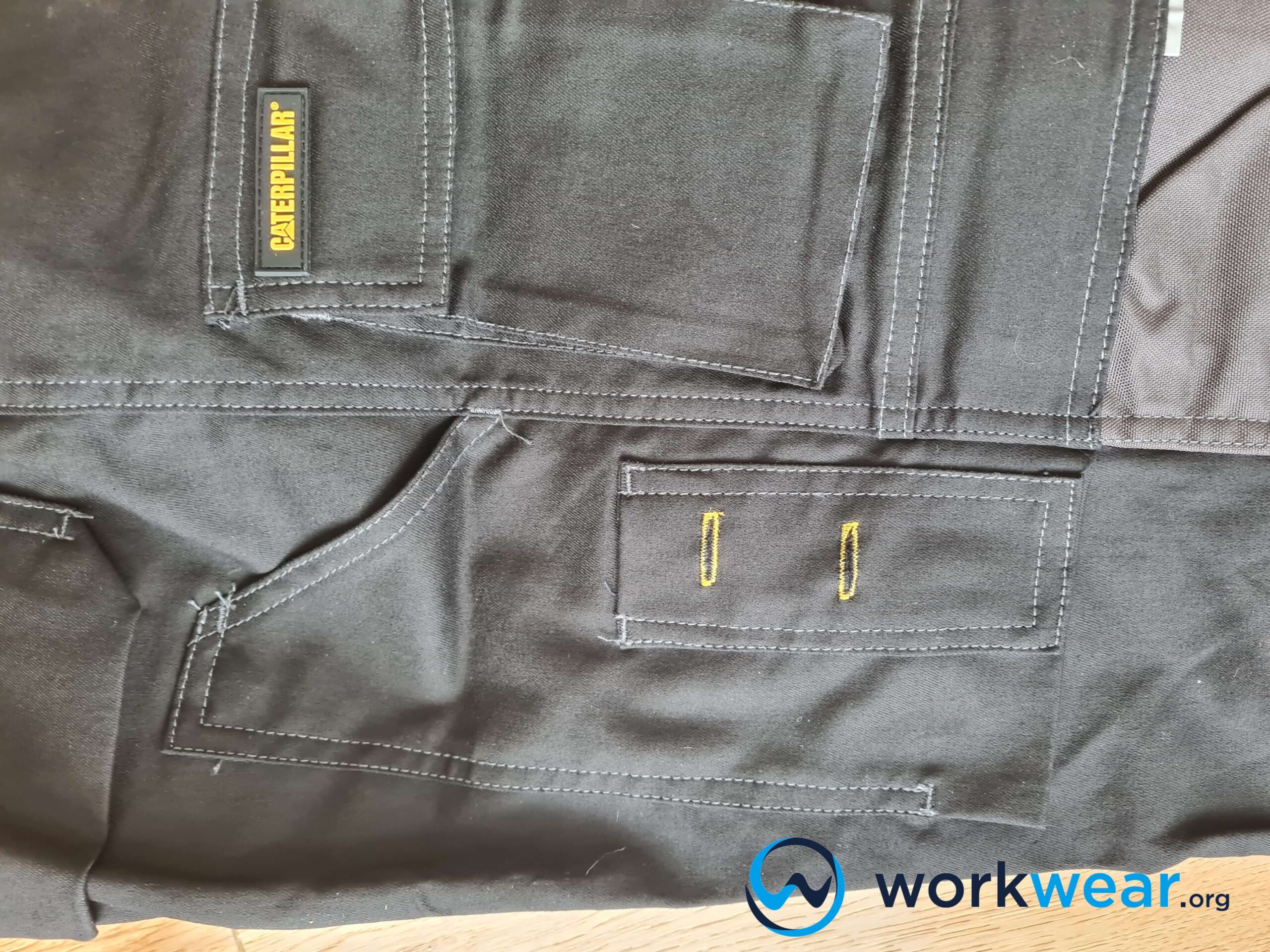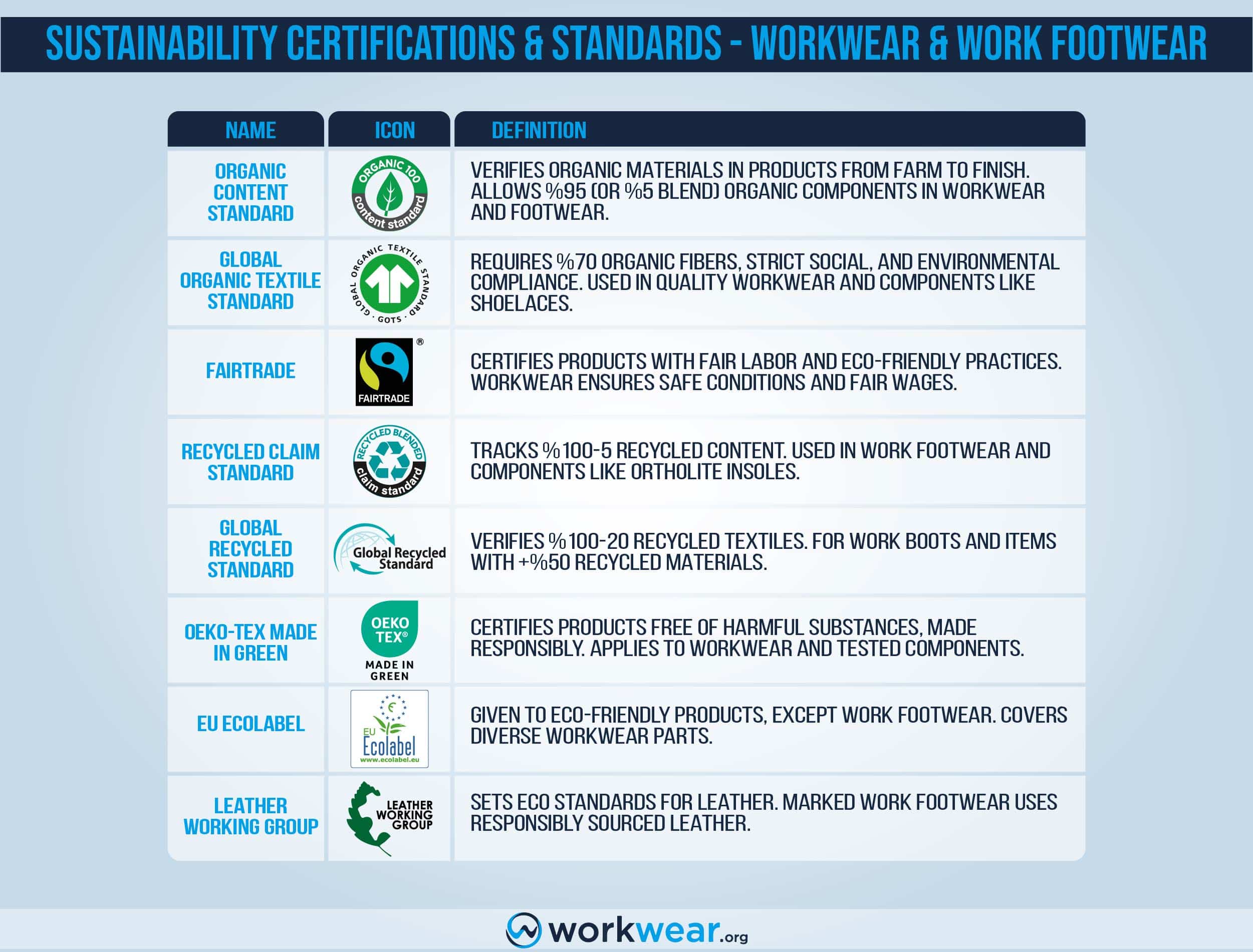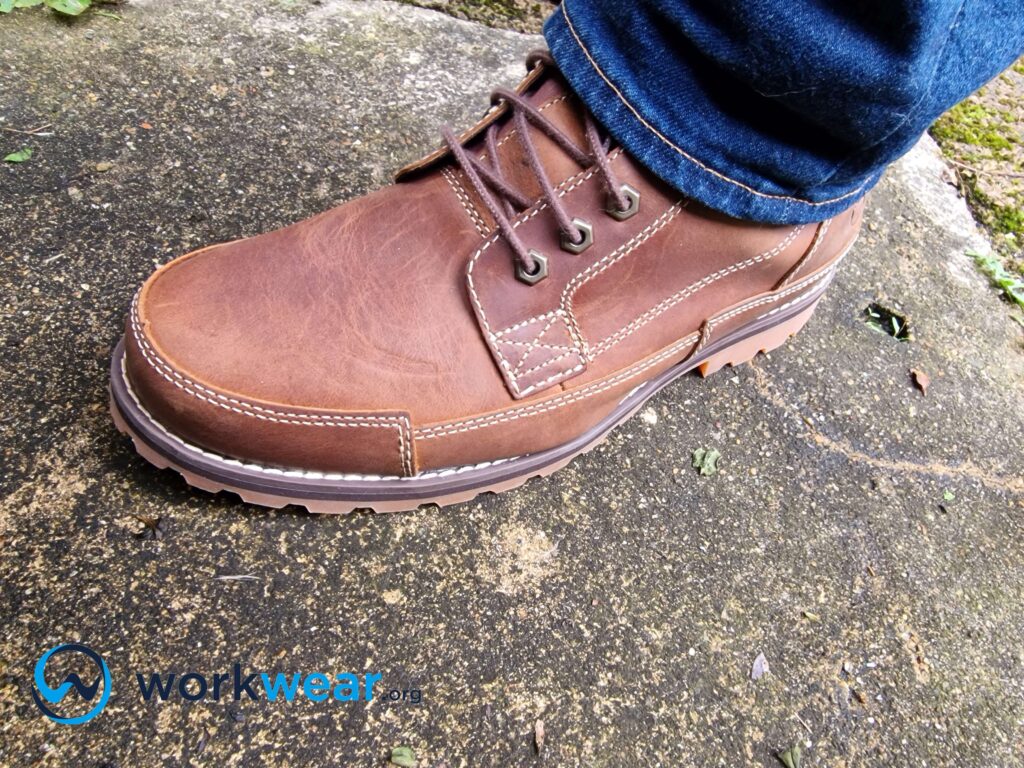Workwear and Sustainability – Definitions & Certifications
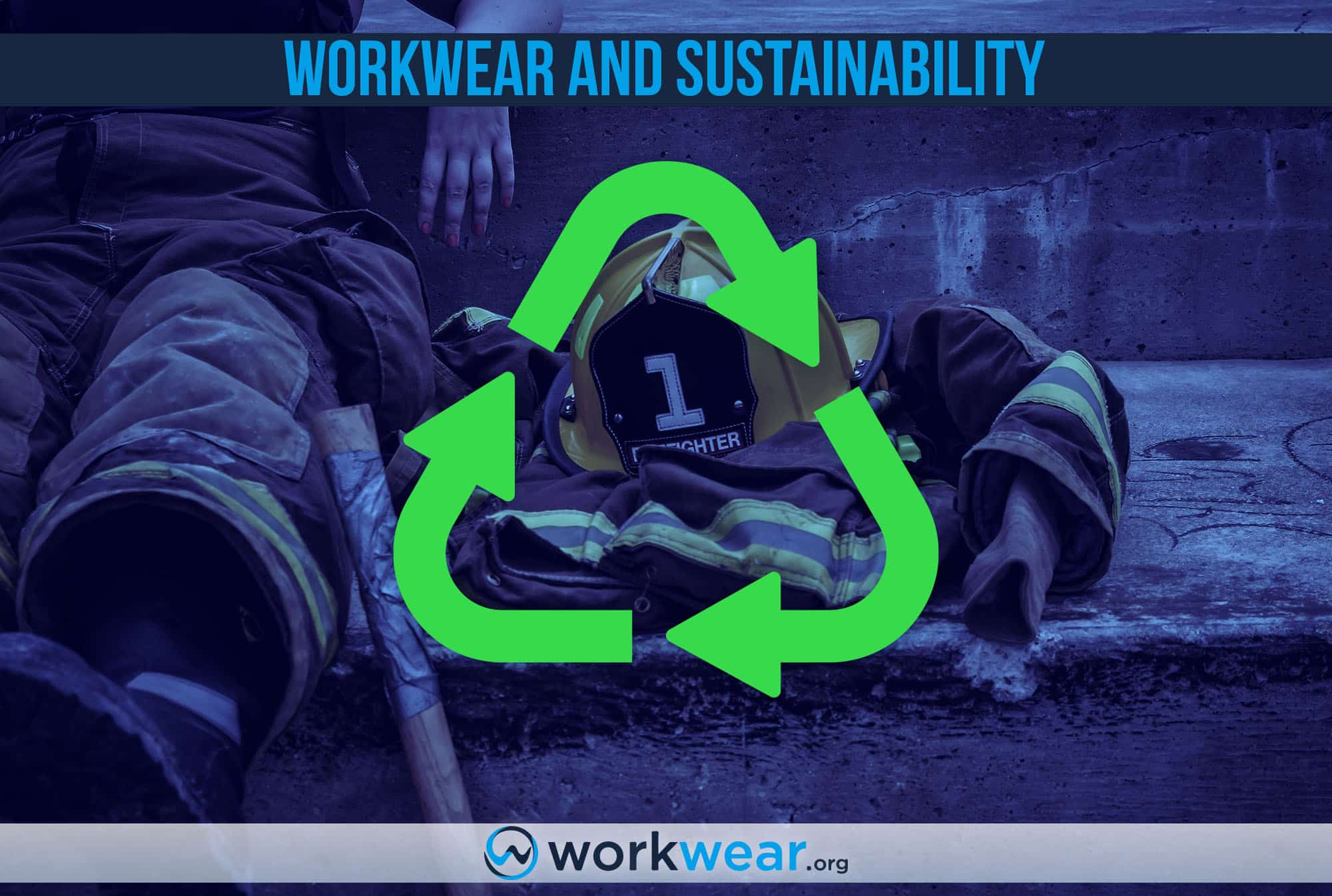
The importance of sustainability is seen in many aspects of our daily lives.
With the availability of more sustainable products in the market, it’s now easier to find environment-friendly options with the desired quality.
In work environments, there’s a growing need for gear that will deliver the required performance more sustainably.
Getting more information on sustainable product options will have great value – whether you’re deciding for your company (and employees) or choosing workwear and work footwear for your personal use.
In this article, we’ll discover how sustainability relates to workwear and footwear, along with some of the most popular brands committed to eco-friendly practices.
What is Sustainable Workwear?
Sustainable workwear is the term used to describe work clothing (including uniforms and PPE) and work footwear built using environmentally sound practices. These products may also have sustainably sourced materials, such as organic cotton and fabrics with recycled components.
They’re manufactured using processes that leave as little impact as possible on the environment – while ensuring the quality and performance needed in variable work conditions.
Sustainable workwear and work footwear also use production methods featuring ethical labor practices.
How Can Workwear and Work Footwear Be Classified as Sustainable?
Certain considerations need to be met first for workwear and work footwear to be classified as sustainable or environment-friendly.
The factors involve the raw materials (and their sources), manufacturing processes, labor practices, and how the product can be disposed of as it reaches the end of its life.
The following terms refer to how workwear and footwear can be classified as environment-friendly or sustainable.
Organic
Sustainable workwear and work footwear can have organic raw materials as main components or structural reinforcements.
These materials are grown with methods that have minimal environmental impact.
An example is organic cotton grown without chemical pesticides or fertilizers and uses much less water.
Recycled
Sustainable workwear products have components that have reused materials.
An example of this is Timberland’s ReBOTL material, which is made from recycled plastic bottles that are reworked to be used as work boots and shoes linings.
ReBOTL results from the brand’s advanced method of recycling waste, specifically plastic bottles. RPET (recycled polyethylene terephthalate) yarns are created and used as inner linings and other components in Timberland shoes and boots.
Carbon Neutral
This term refers to products that have a neutral impact by offsetting the carbon dioxide released into the environment during the production and shipping stages.
Manufacturers may do this by contributing to missions that involve removing or significantly minimizing the carbon dioxide from the atmosphere.
Ethical and Sustainable Labor
The term includes products from manufacturers who practice fair labor practices, including paying fair wages and refusing to engage in child labor.
Ethical labor practices may also involve providing workers with the required PPEs and banning hazardous substances for enhanced safety in the work environment.
Recyclable
Recyclable products can be used long after they have served their original purpose.
This can refer to the entire product or specific components made with components that can be used for other purposes.
How Does the Clothing Industry Relate to Sustainability?
The clothing industry is closely linked to sustainability issues – from the manufacturing process (and even before that) down to how the items are dealt with after their lifespan.
Depending on the methods used, each article of clothing can have a very minimal or severe impact on the environment.
This includes the raw materials used, production methods, and the conditions of the labor force responsible for making the products.
The manufacturing procedures of different clothing items have always been under intense criticism, from the huge amounts of water for cotton production to the harmful chemicals in textile finishing.
In response, the clothing industry has significantly improved to ensure sustainability in compliance with strict government requirements.
The changes are also a result of pressure from consumer groups and the public for products that are sustainable and manufactured in ethical ways.
Sustainability Certifications/Standards Used for Workwear and Work Footwear
Sustainability certifications and standards are guidelines that show a commitment to manufacturing processes that are environmentally, socially, and ethically sound.
Different industries – including the clothing industry – worldwide use these certifications and standards applicable to various production stages.
There are hundreds of these voluntary guidelines in use, and we’re listing the ones most commonly used for manufacturing workwear and work footwear.
Organic Content Standard (OCS) – This voluntary standard is used worldwide to verify raw materials organically grown from the farm until they reach the finished product stage.
OCS-certified materials with at least 95% (for OCS 100; at least 5% for OCS blended) organic components may be used in the main fabric of workwear – such as organic cotton. They can also be used in various parts of work footwear, including the fabric sections of the upper or the inner lining.
Global Organic Textile Standard (GOTS) – This standard is used for organic textiles. GOTS-certified textiles must have at least 70% organic fibers and comply with strict social and environmental standards.
GOTS-certified fabrics such as organic cotton are used in some high-quality workwear and in components that make up work boots or work shoes – including shoelaces and textile sections of the upper.
Fairtrade – This third-party certification aims to protect the rights of the people who work on consumer products. A Fairtrade Mark on a product means that it was manufactured while ensuring the workers’ livelihood and rights, including the right to safe work conditions and fair labor practices.
Workwear products – including aprons – with the Fairtrade mark are guaranteed to be made by workers in safe working conditions with fair wages and following practices that protect the environment.
Recycled Claim Standard (RCS) – This is a voluntary, international standard for tracking recycled raw materials throughout the supply chain. For a product to be RCS-certified, it must comprise between 5% – 100% of recycled materials.
RCS-certified materials, such as OrthoLite insoles (in Timberland Bradstreet Boots) containing at least 5% recycled components – are used in different parts of work footwear, from the soles to the interior. The certification can also be given to workwear that uses some components made with recycled elements.
Global Recycled Standard (GRS) – This standard verifies recycled textiles along with additional guidelines for social and environmental impact. A GRS certification requires a product to have between 20% to 100% of recycled content – but only products with at least 50% recycled components can have the GRS logo.
Work boots can have GRS-certified materials made with at least 50% recycled materials. For example, OrthoLite insoles have a minimum of 20% recycled material, earning the GRS certification and the RCS one. Workwear items such as shirts can
Oeko-Tex Made in Green – This certification states that a product uses materials that have been tested for the presence of harmful substances. It’s used for leather products and textiles manufactured in environmentally-sound facilities, with socially responsible and safe workplaces.
The Oeko-Tex Made in Green certification may be given to workwear items (such as work shirts) or sections of these garments tested with the Oeko-Tex Standard 100 for textiles. Some work footwear products may also have labels for leather components tested using the Oeko-Tex Leather Standard.
EU Ecolabel – This label is given to products that meet the highest standards for environmental friendliness. It’s used for workwear and other non-food products and services.
The EU Ecolabel certification can be given to different parts that make up workwear products, including knitted sections, yarn, fibers, and inner linings. It doesn’t apply to work footwear.
Leather Working Group – This organization is dedicated to setting and maintaining high environmental standards within the leather manufacturing industry. Work footwear with this mark uses leathers that are sourced responsibly and are of high quality.
Work boots use LWG-certified leathers for crafting hard-wearing, superior-quality uppers. Examples are the Caterpillar Second Shift Boots and the Timberland Larchmont Boots.
Which Brands Champion Sustainability in Workwear and Work Footwear – and How
There are hundreds of certifications and standards worldwide for sustainability.
Going one step further, some brands use materials and technology to manufacture workwear and work footwear products that are environmentally friendly without compromising overall performance.
Here’s a list of some of the most popular brands committed to sustainability and how each goes the extra mile to showcase that commitment in its products.
Caterpillar – Caterpillar work footwear products are designed for durability and sustainability.
Its work shoes and boots – such as the Echo Steel Toe Boot – use 100% traceable leathers sourced exclusively from leather supplies certified by the Leather Working Group.
The brand is committed to using as many recycled materials as possible, including cardboard shoe boxes that are 100% recyclable and with at least 80% recycled paper.
The packaging uses water-based inks and solvents, refraining from using petroleum-based options to create fewer emissions.
Caterpillar also follows ethical labor practices, providing fair wages and banning the use of hazardous materials to protect the well-being and safety of workers.
Dr. Martens – Dr. Martens offers some of its products in vegan leather options for those who want animal-friendly options, such as the 1460 Vegan Leather Boot.
The brand also launched a new sustainability strategy in 2022, aiming to create 100% of its packaging with sustainably sourced or recycled materials.
It’s also committed to having products free of fossil-based chemicals by 2035 and producing all footwear using sustainable materials by 2040.
Ariat – Ariat boots are built to last, and the brand has a special program to extend the products’ lives further.
Ariat Reboot encourages the buying and selling pre-loved pairs, keeping them out of landfills for better sustainability.
The brand’s products also feature ethically sourced down and wool, recycled polyester, and organic cotton to maintain environmentally friendly practices.
Ariat is a part of the Leather Working Group, which is committed to using leathers from responsible sources.
Timberland – Timberland aims to reduce its environmental impact by using special components in its work boots and shoes.
Premium leather from tanneries recognized by the Leather Working Group (of which Timberland is a founding member) is used in many Timberland footwear, including the ones in the Earthkeepers line – such as the 6-Inch Original Earthkeepers Boot.
The brand also has the proprietary ReBOTL material – composed of at least 50% recycled plastic bottles – as inner linings of work boots and shoes.
The company also stated its goal of achieving zero waste for 100% of its products by 2030.
Dickies – Dickies uses sustainable materials in some workwear for an eco-friendly take without sacrificing the products’ functionality.
The Fleece Hooded Flannel Shirt Jacket, for example, uses sustainably sourced cotton to create a comfortably soft, lightweight product that’s suitable on the job and for casual use.
The brand also has work pants with recycled threads for reinforcement and faux garment-dyed to significantly reduce the need for large amounts of water during production.
Rockport – Rockport continuously searches for ways to minimize its environmental impact.
This is showcased in products such as the Sharp & Ready Chukka, which uses nubuck leather from a sustainable tannery.
In 2021, the brand launched a special footwear collection with environment-friendly uppers featuring meticulously chosen natural fibers or materials with partially recycled components.
Keen – Sustainability is deeply ingrained in the core of Keen as a company.
By gathering waste and upcycling the materials, Keen uses fewer resources to create high-quality footwear, resulting in minimal garbage.
Waste materials such as plastic bottles are reformulated to create the yarn used for work boots and shoes’ webbing or insulation.
To produce footwear completely devoid of all toxic chemicals and has a lower carbon footprint, Keen products have been PFAS-free since 2018.
The company crafts comfortable, durable footwear that lasts long using high-quality materials from responsible sources.
The Keen Targhee II Soho Shoe is constructed with leather sourced from a Leather Working Group-certified tannery and uses an anti-odor treatment using natural probiotics instead of pesticide-based substances.
Helly Hansen – Helly Hansen boots use leather from tanneries certified by the Leather Working Group for sustainable practices.
Most of the brand’s footwear products, including the Fremont Boot, are PFC-free and use recycled materials for linings and structural reinforcements.
The company follows fair working practices throughout the supply chain. It consciously chooses materials with the least possible impact on the environment to create high-quality products,
Conclusion
Finding sustainable workwear and work footwear options with high quality is getting easier to do nowadays. With more brands committed to creating environmentally friendly products, you won’t have much trouble searching for work gear that’s sustainable as well as suitable for your job. It’s a good idea to learn more about how different manufacturers reduce their products’ environmental impact – without sacrificing overall quality and performance on the job.
FAQ's
- Are sustainable workwear and work footwear products expensive?
- Generally, sustainable products are pricier than ordinary (non-sustainable) alternatives. However, there may be some exceptions to this rule as product pricing is affected by a host of other factors.
- Do sustainable workwear and footwear products only use natural materials?
- No, there are sustainable products that use synthetic materials – such as the ones that use recycled plastic components.
- What makes organic cotton friendlier to the environment than ordinary cotton?
- Organic cotton uses sustainable farming practices, such as using less water for irrigation and eliminating the need for chemical pesticides that can harm the environment.
- Are workwear products with sustainability certifications guaranteed to be sustainable and environmentally friendly?
- Yes, these products have undergone meticulous testing to get the certification from the specified organizations.
678+
Products Reviewed
24+ Years
Combined Experience
500+ Hrs
Field Testing
